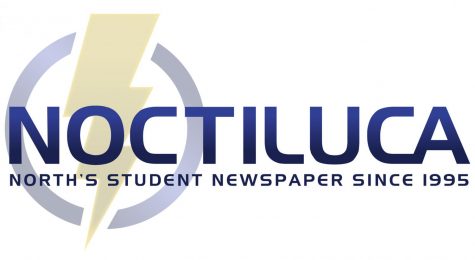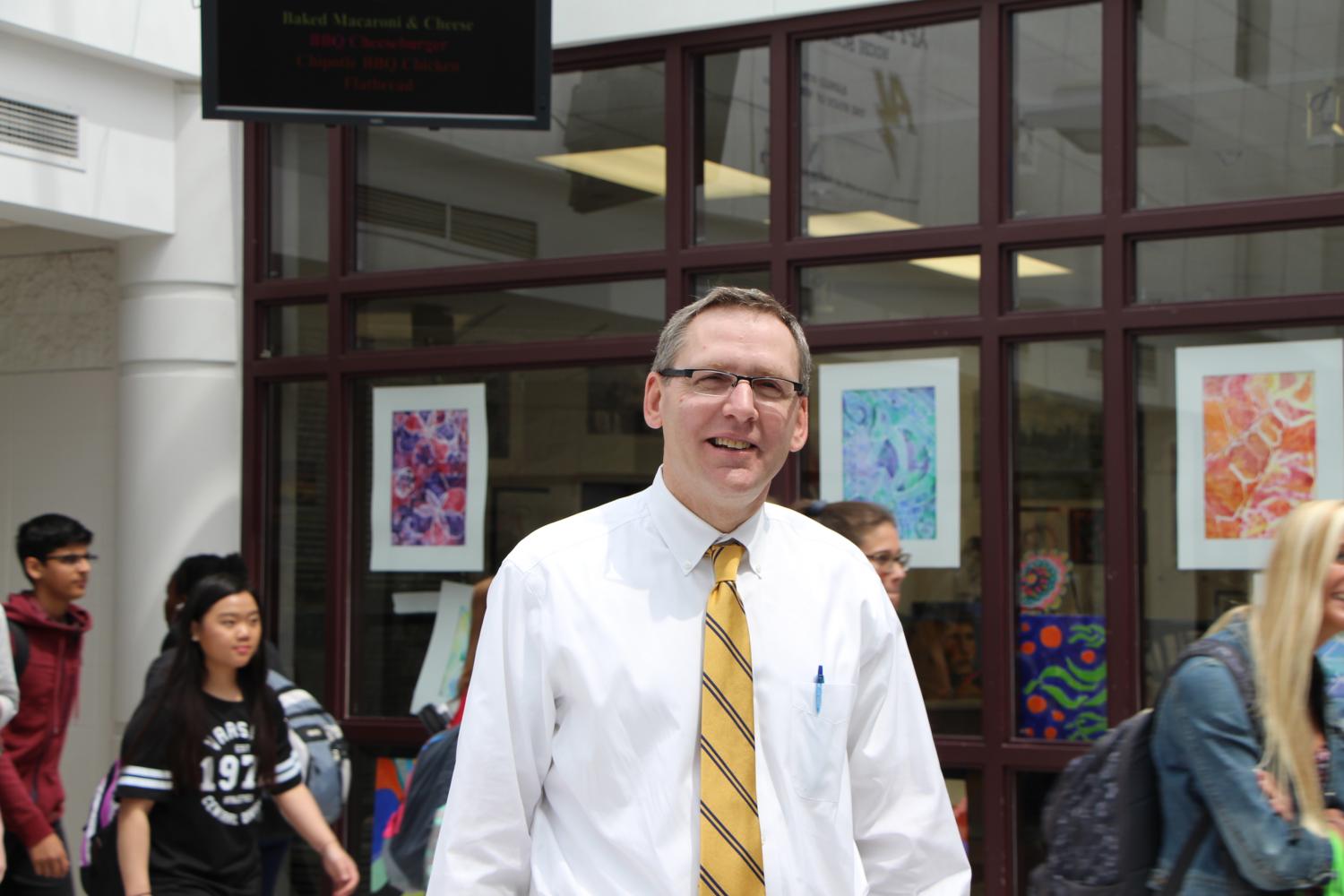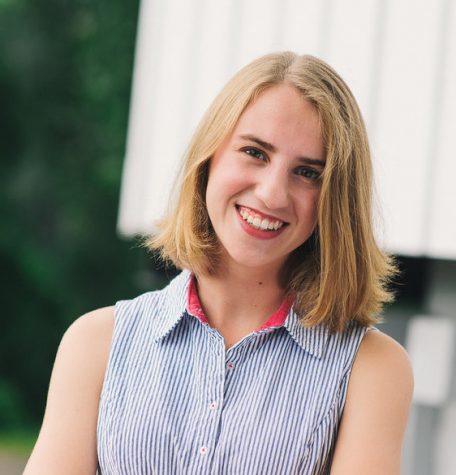Lasting legacies: After 36 years of service to AASD, Superintendent Mr. Allinger retires
Appleton Area School District Superintendent Mr. Lee Allinger celebrates his time with the district.
June 1, 2017
He began his career 36 years ago as a substitute teacher; now he’s the retiring superintendent of the Appleton Area School District. “It’s a tremendously impactful profession, and I’m fortunate to have had such a great opportunity with an excellent school district for so many years and to be a part of it at the teacher level, principal level and then central office. It’s been a real passion and a lot of learning for me as well,” said Mr. Lee Allinger.
The beginning
“My interest in teaching started in 6th grade….you know we all find teachers that make that special connection and I was a young man who had a lot of energy and was maybe somewhat immature and [my 6th grade teacher] found a way for me to get connected to school in a very positive way so I really liked that,” said Allinger. When looking at career choices, the outgoing superintendent had considered an accounting career because of his interest in working with numbers but “ultimately I decided to go with my heart, and education was the direction. Even as a young man I had a bulletin board in my bedroom that I decorated with seasonal stuff like you would have in an elementary classroom, so my interest in education goes way back,” added Allinger.
As he ends his career here in AASD, Allinger has some important words to share with us about the importance of a public education and diversity, of making mistakes and learning, of the future of education and of the state of the district as he leaves it.
The state of the district
“So much takes place before students actually show up in our school,” said Allinger as he spoke to the importance of an early connection with students. There is now a 4K program and the district works hard to connect with families and community agencies, leveraging the “wealth of opportunity” that exists before school even begins. “Certainly in the last decade we’ve become far more connected to children at birth to age 5,” added Allinger. But the desire to be connected with students outside of the grades K-12 realm exists not only before but also after the standard schooling years. The district has been involved in strong career-based learning initiatives. “We want to be viewed as a school district that helps kids be connected to what their future could be beyond high school.”
Among building strong relationships and ensuring students feel safe and welcomed in the district, it has also been a focus of this superintendent to educate “the entire child,” which to him means that “our schools play a significant role in making sure that the arts are a valued part of what happens not only in art class but integrated throughout [the school].”
As the leading visionary for the district, Allinger hopes that students know this is a great place to make mistakes, because he knows there are multiple ways to show understanding and that learning is not solely measured through tests. “Students are going to make mistakes; they’re going to make poor decisions, and I hope that we’re seen as a school district that understands that and that works with kids even when they might be struggling the most, that we’re not pushing them away or turning our backs on them,” said Allinger.
Public education
Allinger places heavy value on diversity and hopes that students realize as they graduate that diversity is our strength. He describes public schools as “perhaps one of the last places of coming together, whether it be different religious groups, different ethnicities, different cultural experiences or different political views.” AASD has a priority pyramid that sets a safe and welcoming community as the basis of a successful district, leading to great instruction and curriculum. School vouchers, Allinger mentioned, he feels hinder the coming together that public schools offer. He’s spoken with various legislators, including Governor Scott Walker, advocating for public schools and educating about the dangers the voucher system can bring.
“I think people are more focused on the money than on what philosophically we want to try to create in the school experience. I think that [school vouchers] will lead to greater segregation.” Allinger believes that it is more powerful to learn about experiences from real people and not by solely reading it in a book. “I do and I don’t get the whole idea that competition will drive improving schools, that’s a business model. We might be better off to take a look at it as schools share information. I think we’d be better off ensuring that all students get quality learning opportunities versus going to a competitive model,” added the superintendent. Speaking about collectively sharing information as a teaching model, Allinger also warned against the system of merit-based pay, deeming it “not a formula for success.”
Future of public education
As Allinger looks forward at the future of education, he thinks there will be a higher level of student responsibility, integration of technology and online courses, and expansion of “anytime, anywhere learning.” This anytime, anywhere learning is facilitated by technology, allowing students access to information and school work at any point. Maybe high schoolers would arrive at different times with more flexibility in coursework and class times, similar to college courses. “You’ll continue to see technology pushing the bounds of the typical school day and school year,” said Allinger. As science advances, Allinger also pointed out that our understanding of brain development will grow, especially in helping with mental health issues. “Those types of developments [in mental health science] will help us better target strategies to work with particular students and their families, and hopefully improve outcomes.”
What’s next?
“I love to bike. And it’ll be nice to not have to go just on weekends or high traffic times in the evening,” said Allinger. Besides enjoying more free time, Allinger plans to stay engaged in the community through his involvement with the Performing Arts Center and the Bubolz boards. Both he and his wife have an educational endowment that will go towards environmental education and he plans to have a different advocacy role for public education.
Soon, his grandkids who live right down the street will enter school, and he plans to support them in their schooling careers. “The school district has allowed me to raise my family.” Three of Allinger’s four children are teachers, one is an artist, and two are married to teachers. “I’m proud that my kids are educators; I love to talk to them about it. Two of them teach in the school district, so I get complaints from all angles,” he said with a laugh, quickly adding that it was okay.
“I’m not necessarily thinking that I have to be done with work; there may be opportunities to serve in a different capacity, most likely not in public education but in some other way. I’ve only known education, so it’s kind of intriguing what other opportunities might come forward. I go to the Copper Rock downtown almost every morning to get my coffee, maybe I’ll serve coffee there or something,” he said with a smile. “I don’t think I have the skills though,” he added with a chuckle. But for now, he’s excited to travel with his wife. As the job of superintendent is all-consuming, they haven’t had the opportunity to explore as much and plan to go to Italy.
Last words of advice
For educators: “You’re so busy, but what an incredibly valuable profession you’ve chosen. Thanks for choosing it. So many kids are counting on you to give us your best. And your best is all you have to give us,” Allinger said warmly.
For students: As he commented on the number of opportunities available, Allinger suggested students take advantage of them. “Don’t be afraid of failure. I think this is the place to do it. This a chance for you to try things and don’t be afraid; we’re going to be there to help you and so are your parents — to pick you up if things don’t go well in the cross country race or on the play stage or playing your bassoon or giving a speech or writing a newspaper article,” Allinger said.
“It’s been my desire to connect with individual students and staff. That’s been really important to me. I hope that people recognize, and I think they do, that I’ve tried to keep that [connection]. Everyone has ideas, but we have 1,800 people on our staff and I would hope that if I had a legacy, if there’s such a thing, it wouldn’t be a particular program or project. It would be more about the idea that to be a good educator or good school district, you need all 1,800 people feeling that they can bring their innovation and ideas to work with kids. Every student is so different in what they might need to be effective, so I would hope that my legacy would be around leveraging the strength of everyone on our staff and also in our communities.”



